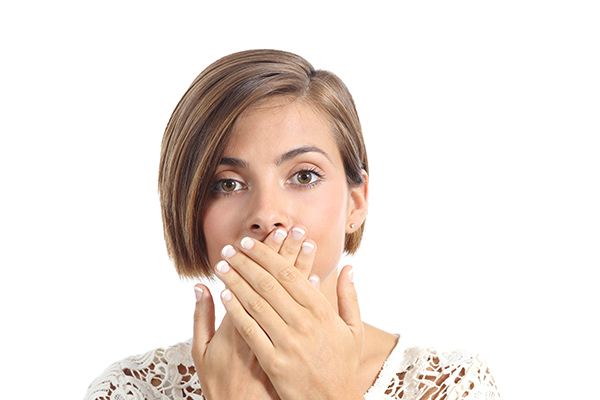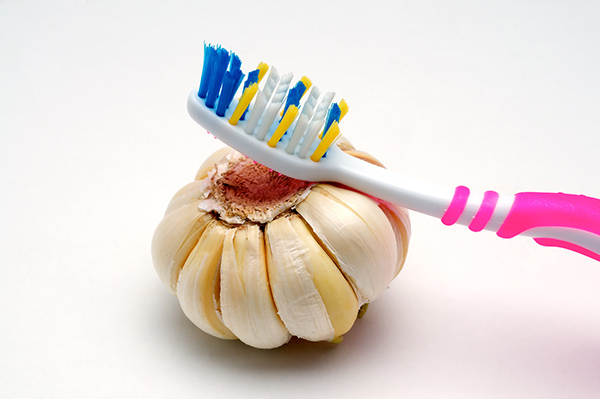
It’s important to take care of your oral health to prevent tooth decay and gum disease. But good dental health isn’t the only benefit you get from healthy habits – you also keep your breath fresh. However, even the best brushing and flossing can’t protect you from all of the foods that cause bad breath.
If the thought of halitosis gives you anxiety, here are some foods you’ll want to avoid and the reasons they give you bad breath.
#1. Garlic
When it comes to foods that cause bad breath, none are more infamous than garlic. Even a small amount of garlic in your food can dramatically impact the quality and odor of your breath. More surprisingly, garlic’s unique odor can even radiate from your skin after ingestion.
If you’ve ever cooked with garlic, you may have noticed that the distinct smell isn’t noticeable when you have a whole clove. This is due to the complexity in what makes garlic smell the way it does: it’s a chemical reaction that only occurs when the garlic is damaged in some way.
Typically, this is immediately recognizable the moment you begin chopping, dicing or crushing your garlic for a meal. Inside the clove is an enzyme known as “allinase.” When sliced into or crushed, allinase is released and combines with alliin molecules in the garlic. Usually alliin is odorless, but allinase converts it into an overwhelming sulfurous compound known as allicin.
Eating garlic introduces this compound into your mouth and bloodstream. When allicin breaks down, it converts into other sulfurous compounds that all contribute your breath. Because it’s also in your bloodstream, the odor is sometimes noticeable in your sweat too!
Some compounds in garlic metabolize slowly – leading to a persistent odor that can last an entire day or two.
#2. Horseradish
Unique in taste, horseradish is a food that you either love or hate. That one-of-a-kind flavor comes from a unique chemical known as allyl isothiocyanate, or mustard oil. Like garlic, this chemical compound is the result of cutting or smashing the horseradish root. Some consider it to be one of the strongest smells you can find in nature.
In nature, this is a defense mechanism against hungry critters. The released chemicals do more than just smell bad – in more concentrated doses, they irritate your eyes and even burn your lungs.
On the other hand, horseradish is a great source of fiber, potassium, calcium, vitamin C and other essential minerals. With all of its health benefits, it may be worth the temporary bad breath to eat!
#3. Alcohol
One interesting source of chronic bad breath is alcohol. Because alcohol is a desiccant, it dries your mouth and impacts your saliva production. Dry mouth, also known as xerostomia, can lead to a variety of problems.
Of these problems, halitosis is often one of the most notable. But dry mouth itself doesn’t make your breath smell bad. It’s due to the bacteria in your mouth.
No matter how well you take care of your teeth and gums, there will be at least a small volume of bacteria in your mouth. These bacteria thrive in certain conditions, and a dry mouth is one of them. Without saliva to help wash it all away, the bacteria leave behind their own sulfuric compounds with strong odors.
Alcohol doesn’t have to be ingested to dry your mouth. Drinks or rinses that contain alcohol will begin to impact your saliva production as long as it’s in your mouth at all. This is why many mouthwashes advertise that they don’t have alcohol in them.
Halitosis can be embarrassing, but it’s far from the worst side-effect of chronic dry mouth. Saliva protects your teeth and gums from decay. If you frequently have alcoholic drinks or use alcohol mouth washes, you could be increasing your chances for periodontal disease.
#4. Coffee
Nobody likes their morning breath – especially when coffee is an inseparable part of your routine. Despite its eye-opening effects, coffee can give you a show-stopping case of bad breath. In fact, it’s such a unique odor that the term “coffee breath” has become a common phrase.
Coffee’s impact on your breath is caused by more than one factor. Like other sources of halitosis, coffee introduces sulfur compounds to your mouth. This, as with all sulfur compounds, gives you an immediate case of bad breath.
Caffeine, the primary motivator behind most drinker’s coffee habit, also leads to odorous breath. How? By drying your mouth! In the same way that alcohol can encourage bacterial growth that heightens bad breath odors, the caffeine in coffee won’t do your breath any favors.
Depending on how you take your coffee, you could be making it worse. Do you add sugar or sweeteners to your coffee? Sugars are very common in the western diet, and they are the preferred food source for bacteria in your mouth. These additional sweeteners will increase tooth decay and promote bacteria to feed and leave behind waste.
Tips to Avoid Bad Breath
#1. Brush Your Teeth to Remove Bacteria

The number one cause of chronic bad breath is due to bacteria and bacterial byproducts. When you brush your teeth, you remove these bacteria and the waste they produce, including sulfurous compounds that contribute to strong odors.
Some foods that cause bad breath, like garlic, won’t be so easy to get rid of. But for most smells, brushing your teeth and even your tongue can very effective to freshen your breath.
#2. Use a Non-Alcoholic Mouth Rinse
Mouth rinses are a popular way to improve your breath and temporarily mask chronic halitosis. It’s important to note, however, that many mouth rinses contain alcohol. In the short term, the ingredients in a mouthwash may make your breath smell fresh. But when that smell dissipates, your dry mouth may let bacteria thrive.
#3. Plan Your Meals
Unfortunately, excluding every food gives you bad breath isn’t a sensible plan for your diet. Foods like horseradish, coffee and even onions – all known for their effect on your breath – also come with countless health benefits.
Instead of trying to avoid foods that may lead to bad breath, consider planning your meals to avoid them during social events. Try not to include garlicky foods in your lunch at work, for example.
#4. Chew Sugarless Gum
Do you reach for the after-dinner mint? Try sugar-free gum instead! Mints often have sugar in them, which in turn promotes growth with bacteria in your mouth. Sugar-free gum immediately freshens your breath and it also stimulates saliva. The saliva will go a long way to neutralize and wash away remnants of plaque and bacteria.
Suffering from Chronic Bad Breath? Schedule an Appointment Today!
Pointe Dental Group can provide you with a complete examination, answer your questions, and discuss your options. Schedule an appointment with us today! New patients can receive FREE comprehensive exam and consultation, plus a full panoramic x-ray with a paid cleaning procedure (a $200 value)!
Grosse Pointe Farms: (313) 881-2480
Shelby Township: (586) 803-8300
Don’t miss a thing! Connect with us on Facebook!
